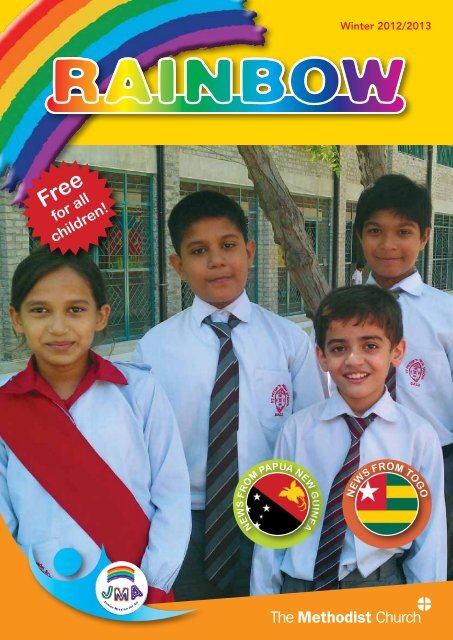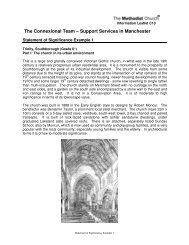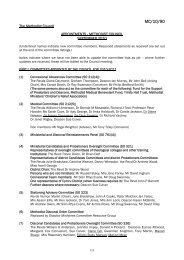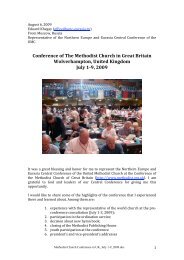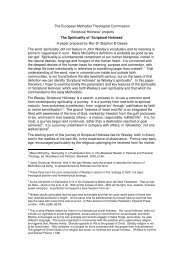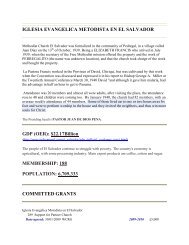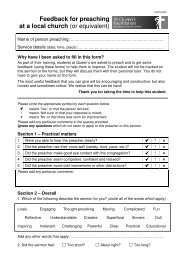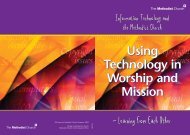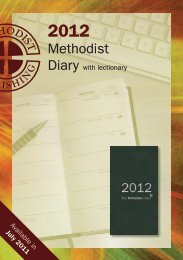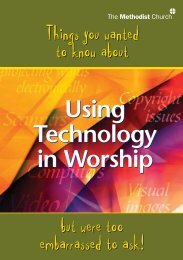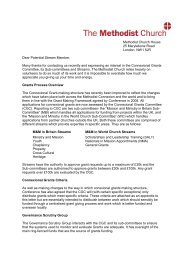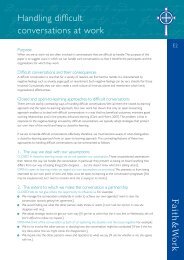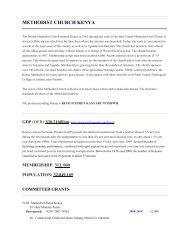Rainbow-Winter 2012-2013 - The Methodist Church of Great Britain
Rainbow-Winter 2012-2013 - The Methodist Church of Great Britain
Rainbow-Winter 2012-2013 - The Methodist Church of Great Britain
You also want an ePaper? Increase the reach of your titles
YUMPU automatically turns print PDFs into web optimized ePapers that Google loves.
NEWS FROM PAPUA NEW GUINEA<br />
<strong>Winter</strong> <strong>2012</strong>/<strong>2013</strong><br />
Free<br />
for all<br />
children!<br />
NEWS FROM TOGO
2<br />
Contents<br />
Meet our new friends …………2<br />
Papua New Guinea<br />
What’s going on in<br />
Papua New Guinea<br />
……………3<br />
……………4<br />
Meet our new friends<br />
Meet our school party <strong>of</strong> aliens from the planet Wez<br />
who are on a tour <strong>of</strong> the universe with their geography<br />
teacher Flobo. Klax and Traz have never left their planet<br />
before and are very excited. <strong>The</strong>y have landed on our<br />
world to find out about World Partner <strong>Church</strong>es and the<br />
work that JMA and the World Mission Fund support.<br />
Hot bananas in coconut milk 5<br />
Design your own traditional<br />
mask …………………………………6<br />
Animals <strong>of</strong> Papua New<br />
Guinea wordsearch ……………7<br />
My name is Flobo and I am<br />
a geography teacher on my<br />
planet. I love adventure.<br />
Being creative in Pakistan… …8<br />
Responding to natural<br />
disasters ……………………………9<br />
After school club in Latvia 10<br />
Working in Antigua ………… 11<br />
Hi! My name is Traz<br />
and I am one month,<br />
two days and three<br />
hours older than Klax.<br />
Prayer focus …………………… 12<br />
Tasty fundraising ideas …… 14<br />
JMA members page ………… 15<br />
Togo ……………………………… 16<br />
Hi! My name is Klax.<br />
Traz is my best friend.<br />
JMA Secretaries news … 18-19<br />
Parlez-vous français ……… 20<br />
Use <strong>of</strong> photographs<br />
We love to receive photos from events and <strong>of</strong><br />
collectors receiving their certificates and badges.<br />
<strong>The</strong>y can be emailed to childrenandyouth@<br />
methodistchurch.org.uk or posted to Children &<br />
Youth, <strong>Methodist</strong> <strong>Church</strong> House, 25 Marylebone<br />
Road, London NW1 5JR.<br />
All photographs should include written<br />
confirmation that written parental consent has<br />
been obtained (and the date it was obtained) for<br />
the image to be used in <strong>Rainbow</strong>. We are unable<br />
to use any images that do not confirm you hold<br />
parental consent.<br />
Planet Wez is very small and<br />
covered with water. We live<br />
in cities under the sea. On our<br />
travels and adventures across<br />
your planet, we’re going to<br />
visit many places.<br />
<strong>Methodist</strong> <strong>Church</strong>, 25 Marylebone Road, London NW1 5JR<br />
Tel: 020 7486 5502 Email: childrenandyouth@methodistchurch.org.uk
3<br />
Country facts:<br />
Papua New Guinea<br />
Capital City: Port Moresby<br />
Population: 6.8 million<br />
Climate: Tropical, with a monsoon<br />
season<br />
Currency: the Kina<br />
Language: the three <strong>of</strong>ficial languages<br />
are English, Tok Pisin and<br />
Motu. <strong>The</strong>re are<br />
approximately 860<br />
other languages.<br />
Papua New Guinea has several<br />
thousand separate communities,<br />
divided by language, customs and<br />
traditions.<br />
<strong>The</strong> United <strong>Church</strong> in Papua New Guinea<br />
(UCPNG) has a membership <strong>of</strong> 600,000<br />
organised into 2,700 congregations.<br />
<strong>The</strong> <strong>Methodist</strong> <strong>Church</strong> in the UK has<br />
approximately 513,000 people who<br />
attend our churches in some capacity.<br />
<strong>The</strong>re are 700 ministers and 1,600 pastors in the United<br />
<strong>Church</strong> <strong>of</strong> Papua New Guinea. <strong>The</strong>re are 6 high schools,<br />
400 primary and community schools, 3 vocational schools<br />
and many more elementary schools.<br />
Images used in this publication are reproduced courtesy <strong>of</strong>: © Photos.com, © TMCP<br />
© Trustees for <strong>Methodist</strong> <strong>Church</strong> Purposes<br />
Design and production: <strong>Methodist</strong> Publishing Registered Charity No 1132208.<br />
www.childrenandyouth.org.uk
4<br />
What’s going on in Papua New Guinea<br />
Steve Pearce, partnership co-ordinator for Asia<br />
and the Pacific, talks about our mission partners<br />
in Papua New Guinea.<br />
Steve Pearce<br />
Steve visited the United <strong>Church</strong> <strong>of</strong><br />
Papua New Guinea (UCPNG). JMA<br />
and the World Mission Fund support<br />
this church in many ways.<br />
Each village elects a committee to<br />
look after the new water system and<br />
the taps and a family pays about<br />
£10 to begin using one <strong>of</strong> these<br />
taps.<br />
<strong>The</strong>re are many poor and remote<br />
villages in this country. Taupota is<br />
one <strong>of</strong> these.<br />
<strong>The</strong> UCPNG tries to help is by<br />
helping villages to form a water<br />
committee to build a small dam<br />
(only about 1.5 metres high) and run<br />
pipes around the village. Taps are<br />
then shared by three, four or five<br />
houses.<br />
Many villages also send someone<br />
to train as a village health volunteer<br />
(VHV). <strong>The</strong>y learn about hygiene<br />
and good practice with rubbish,<br />
protecting the clean water, looking<br />
after the area around the tap,<br />
washing and keeping clean etc.<br />
<strong>The</strong> other important thing is toilets!<br />
You make one by digging a twometre<br />
hole. <strong>The</strong>n you put this over<br />
the top <strong>of</strong> the hole and build a little<br />
hut around it. <strong>The</strong>re is no water<br />
involved (<strong>The</strong>re is not enough water<br />
for this!). This kind <strong>of</strong> toilet is called<br />
a ‘long drop’. It’s very hygienic and it<br />
doesn’t smell!<br />
In the picture you see Fiona (the girl)<br />
and Philipa enjoying the tap near<br />
their home.<br />
Running water means better health<br />
and the convenience <strong>of</strong> not having<br />
to go to the river or the sea to wash.<br />
Without these toilets all you can do<br />
is go to the toilet in the forest!<br />
<strong>The</strong> <strong>Church</strong> helps provide these<br />
toilets. <strong>The</strong>y cost about £200 each<br />
and are shared by a few families<br />
– resulting in many health and<br />
environmental improvements.
5<br />
Hot bananas in coconut milk<br />
Here is a Papua New Guinea recipe to try. You will need an adult to help you.<br />
You will need<br />
☻ 6 bananas<br />
☻ 2 tablespoons<br />
granulated sugar<br />
☻ 2 cups coconut milk<br />
☻ ½ teaspoon salt<br />
Preparation<br />
1. Peel the bananas<br />
and chop into 5cm<br />
pieces.<br />
2. In a saucepan, heat<br />
the coconut milk<br />
with the sugar and<br />
salt, and cook gently<br />
until the sugar has<br />
dissolved. Add the<br />
banana pieces and<br />
cook gently for 5<br />
minutes. (Adult<br />
supervision is<br />
required for this.)<br />
3. Divide the mixture<br />
into 6-8 small bowls<br />
and serve warm.<br />
www.childrenandyouth.org.uk
6<br />
Design your own<br />
traditional mask<br />
Masks have been a<br />
feature <strong>of</strong> human<br />
civilization for<br />
thousands <strong>of</strong><br />
years and vary<br />
from culture<br />
to culture.<br />
In Papua<br />
New<br />
Guinea<br />
they hold<br />
a mask<br />
festival<br />
each year.<br />
Animals <strong>of</strong><br />
Papua New Guinea<br />
On a walk through the forests<br />
<strong>of</strong> Papua New Guinea, you may<br />
encounter the world’s largest<br />
pigeon, the Southern Crowned<br />
Pigeon. You could also see<br />
the world’s smallest parrot<br />
(the Red-breasted Pygmy<br />
Parrot) and the longest Lizard<br />
(Salvadore’s Monitor lizard).<br />
You might even see a treeclimbing<br />
kangaroo! Sooner<br />
or later, the world’s largest<br />
butterfly, the Queen Alexandra<br />
Birdwing, will flutter by. Papua<br />
New Guinea also has the tallest<br />
tropical tree on the planet: a<br />
conifer called Araucaria, which<br />
can grow up to 70 metres high.<br />
Huon Tree Kangaroo
7<br />
t o - p m f t a u t g - e m r r b t a e o m f t u e f n e a m e<br />
s o a r r o n r s e f t v e r a l d b a s t u m r u e e y d e -<br />
b n c u c b a a d e l b p l n l y o g g r o a o f m n w f b i o<br />
i s o r d e o y i a y r o i a g d r t i n k a i r ’ o g t i e n<br />
o i o t o r e r b t r y r t r i o i a f r e m t e b n u o s n t<br />
e e t d i s e f m a i e b o t s f a n r n d e e d l e i m m e o<br />
b a o e s e s y e b v c n m i r g ’ e ’ s a t h d b r n m a f m<br />
r s i a f e g n a f e a s t e r n s m a l l t o o t h e d r a t<br />
u e b u l m e r s f r u i t b a t t m s a o o l i d c a k c r f<br />
t a e t a o o e a i t r a l r o f r t e c e t n f c l b r k m a<br />
h a m p i o n ’ s t r e e m o o s e t e b s d a r a e i ’ ’ t e<br />
a l i o i m h s r s u a i u n c d e b a o e n m i h e g x s y -<br />
s o l r ’ f r s s a m e s l i t r k m f r i r a f u m - o t s g<br />
c s r o n a t w t m p i e o u e i a e e u a d a e o g e f r l e<br />
x o f g n i y l f d e c a f y e k n o m e l l i v n i a g u o b<br />
o e s i e k r e l e t o e i h a f g e o c f i l d t a r n m n t<br />
t a b d e c a f - r e w o l f s a a i s a e t g y r o e i p g o<br />
o y t g e t a e r a a t o s l t v r e r n g e k a e s d y e f n<br />
t t s a e e t r i e r y e h s e g o t s c a e m e e a b l t o u<br />
t e a s e e s m r g e t c e d r s o t i w c e d o k n a f e o t<br />
l w l a i o r e e i d e l p o n c e l e t ’ s g i a n t r a t i<br />
s t s o r s a a u b b s s i t s r g t w e g b r a n f s e r e k<br />
e r a s y m t c l l a c r e d h f t o r i t u t - g l s s e d r<br />
l e p a t m t c s e t g s r n r l o t d e k a l s a e n s d w f<br />
r a b t a e b r p e g g a b b e s h e s t a v v i r n e e b a a<br />
g i n a a a a k t r a o e a t w h d i s r n o r b o t e l a t s<br />
b c h a m p i o n ’ s t r e e m o u s e a a d f l o e l n t e i<br />
e a p a t n f i r c t - w t u o s r r f b m i i n ’ a - p n r h<br />
s e w r w s r n r e i r a t e u u r - o r r i t t e e i m e r t<br />
a a b i s r b f n h f f a o u s f a s n y m e a e f e u e o a t<br />
o i n g s t m p e y n i f e r e v p e r b o l l c r x r m s t l<br />
Big Eared Mastiff Bat<br />
Bismarck’s Trumpet Eared Bat<br />
Bougainville Monkey Faced Flying Fox<br />
Bulmers Fruit Bat<br />
Champion’s Tree Mouse<br />
Doria’s Tree Kangaroo<br />
Eastern Shrew Mouse<br />
Eastern Small Toothed Rat<br />
Flower-faced Bat<br />
Fly River Trumpet Eared Bat<br />
Huon Tree Kangaroo<br />
Lesser Flying Fox<br />
Long Footed Water Rat<br />
New Guinea Big-eared Bat<br />
Poncelet’s Giant Rat<br />
www.childrenandyouth.org.uk
8<br />
Being creative in Pakistan<br />
Earning Hands Project<br />
<strong>The</strong> Women’s Development and Service<br />
Society (WDSS) is part <strong>of</strong> the <strong>Church</strong><br />
<strong>of</strong> Pakistan. <strong>The</strong> World Mission Fund<br />
and JMA supported them with a<br />
grant for £20,000 to enable them to<br />
help women’s development in the<br />
community. One project that has<br />
been enabled with this grant is the<br />
Earning Hands Project which trains<br />
women in skills that will help them<br />
generate an income.<br />
Here is a woman from the<br />
project using her skills.<br />
<strong>The</strong> grant from JMA and the<br />
World Mission Fund has helped<br />
to buy new sewing machines.<br />
<strong>The</strong> stitching unit (tailoring shop) has<br />
new machinery and new staff have been<br />
appointed and are being trained. <strong>The</strong> staff<br />
are looking at supplying schools and colleges with<br />
uniforms and costumes for special events and theatre<br />
productions. <strong>The</strong> project is approaching churches about<br />
making clergy garments and church accessories.<br />
Two vocational classes at Margzar Colony and Youhanabad<br />
have been started. Each class has 25-30 women learning skills<br />
they can use in their community to earn money.<br />
<strong>The</strong>se uniforms are<br />
supplied by the Earning<br />
Hands project.<br />
Country facts: Pakistan<br />
Capital City: Islamabad<br />
Population: 177 million<br />
Population below poverty line:<br />
Tropical, with a monsoon<br />
season<br />
Languages spoken:<br />
Punjabi, Sindhi, Pashtun, Urdu,<br />
Balochi, English and many<br />
other local languages<br />
Religions: Islam (97%), Hinduism,<br />
Christianity and others (3%)<br />
Currency: Rupee
9<br />
Responding to natural disasters<br />
In October, you may have heard about Hurricane Sandy on<br />
the news. A grant <strong>of</strong> £18,000 from the World Mission Fund<br />
was sent to help repair the damage left by the storm that has<br />
wreaked havoc across Jamaica, Cuba, the Bahamas, Haiti<br />
and the east coast <strong>of</strong> the United States.<br />
<strong>The</strong> Revd Tom Quenet, partnership coordinator<br />
for Latin America & the Caribbean, said that<br />
Hurricane Sandy was the largest and most<br />
destructive <strong>of</strong> the Caribbean’s <strong>2012</strong> hurricane<br />
season.<br />
“Living in the Caribbean you expect hurricanes between June<br />
and November,” he said. “What you can never tell is how<br />
intense they will be and what impact they will have as they<br />
pass near you.”<br />
Bishop Ricardo Pereira visited the communities in Cuba worst<br />
affected. Once the storm had passed, many church members<br />
whose homes had lost ro<strong>of</strong>s and were damaged met to hold a<br />
prayer meeting in the open air.<br />
Hurricane Sandy battered Jamaica, Cuba, the Bahamas and<br />
indirectly affected Haiti and the Dominican Republic. In Haiti,<br />
which is still recovering from the 2010 earthquake, the streets<br />
<strong>of</strong> Port au Prince were flooded and<br />
people were left without homes or jobs.<br />
What is a<br />
hurricane<br />
A hurricane is a rotating tropical storm<br />
with winds <strong>of</strong> at least 74 miles per<br />
hour. <strong>The</strong>se storms are <strong>of</strong>ten compared<br />
to tornadoes because <strong>of</strong> the way that<br />
they rotate. However, tornadoes are<br />
much smaller in size than hurricanes.<br />
<strong>The</strong> best way to view a hurricane is<br />
from above because <strong>of</strong> its massive size.<br />
Create<br />
your own<br />
hurricane<br />
experiment<br />
1. Fill a 1ltr s<strong>of</strong>t drink bottle with<br />
plain water. If you don’t have<br />
a sink nearby, you will need to<br />
obtain a large jug filled with<br />
water in order to fill the bottle.<br />
2. Figure out how long it will<br />
take to empty the filled bottle<br />
and then write your prediction<br />
down. Empty the bottle<br />
without squeezing its sides.<br />
Do this several times and<br />
write down the exact amount<br />
<strong>of</strong> time that it takes for the<br />
bottle to empty.<br />
3. Fill the bottle again, but this<br />
time while emptying the<br />
water, swirl the water around<br />
within the bottle by rotating<br />
the bottle counter clockwise.<br />
Keep swirling the bottle<br />
until it forms a tornado-like<br />
rotation within the bottle.<br />
Optional: You could add a few<br />
drops <strong>of</strong> food colouring or paint<br />
to add colour to your hurricane.<br />
www.childrenandyouth.org.uk
10<br />
After-school<br />
club in Latvia<br />
This gives children with a<br />
place after school where<br />
they are safe and <strong>of</strong>f the<br />
streets. It provides a space<br />
where they can do their<br />
homework and have a hot meal,<br />
plus spiritual and moral support.<br />
<strong>The</strong> project provides an alternative<br />
to hanging on the streets and <strong>of</strong>fers<br />
a hot supper, which they might<br />
not receive at home. Liepa is a<br />
depressed area <strong>of</strong> Latvia with<br />
high unemployment, alcoholism<br />
and drug use.<br />
In the after-school program<br />
they receive love, warmth, and<br />
are taken care <strong>of</strong>, and learn<br />
about God. Some children,<br />
once they begin to trust,<br />
start attending the<br />
church Sunday School<br />
classes.<br />
<strong>The</strong> Liepa after-school programme is<br />
run by the United <strong>Methodist</strong> <strong>Church</strong> in<br />
Latvia. It has received a 2,500 Euro<br />
grant from the World Mission<br />
Fund in 2011 and <strong>2012</strong> to<br />
support the development <strong>of</strong><br />
an after-school club.<br />
Country<br />
facts: Latvia<br />
Some children who<br />
attend have a<br />
difficult family life,<br />
so they also have<br />
a hot meal to take<br />
home. Many <strong>of</strong><br />
the children have<br />
never been anywhere<br />
outside their village,<br />
and sometimes<br />
the club goes on<br />
outings to places<br />
such as the zoo in<br />
Riga.<br />
Full name: Republic <strong>of</strong> Latvia<br />
Capital city: Riga<br />
Population: 2.2 million<br />
Major languages: Latvian, Russion<br />
Major religion: Christianity<br />
Currency: 1 lats - 100 santims<br />
Main exports: Timber and wood products;<br />
fish and fish products
11<br />
Working in<br />
Antigua<br />
Country facts: Antigua<br />
Capital city: St John’s City<br />
Population: 85,700<br />
Currency: East Caribbean Dollar<br />
Language: English<br />
St John’s City is the main commercial centre <strong>of</strong><br />
Antigua and has the largest harbour, capable <strong>of</strong><br />
berthing five ships, sometimes more.<br />
Chris and Vera Lacey<br />
are mission partners in<br />
Antigua. <strong>The</strong>y work at<br />
the Gilbert Agricultural &<br />
Rural Development Centre<br />
(GARDC), where they work<br />
with computers and train<br />
others in computing too. Many<br />
women and young people come<br />
to GARDC for training, and the<br />
young people join the Caribbean<br />
Youth Empowerment<br />
Programme (CYEP).<br />
According to Chris and<br />
Vera, the young people<br />
receiving the training <strong>of</strong>ten<br />
dropped out <strong>of</strong> school, have<br />
no jobs and are at high risk <strong>of</strong><br />
joining gangs or becoming drug<br />
dealers.<br />
Chris says, “Despite harsh<br />
economic conditions, the job<br />
prospects in both the tourism<br />
industry, and especially the<br />
area <strong>of</strong> yacht maintenance,<br />
appear to be strong. We’re very<br />
hopeful that many <strong>of</strong> our current<br />
aspiring trainees will be able to lift<br />
themselves out <strong>of</strong> their current<br />
circumstances and get on the<br />
path to a great career.”<br />
www.childrenandyouth.org.uk
12<br />
Latvia<br />
Pakistan<br />
El Salvador<br />
Cuba<br />
Jamaica<br />
Bahamas<br />
Haiti<br />
Antigua<br />
Togo<br />
Papua<br />
New Guinea<br />
Talk to God about the world<br />
Lego tower<br />
Build a Lego tower. Each person<br />
who adds a block has to think <strong>of</strong><br />
a different country and pray for it.<br />
Bubble prayers<br />
Blow some bubbles and pop a bubble and pray<br />
for each project in <strong>Rainbow</strong>.<br />
If you feel worried about a part <strong>of</strong> the world or<br />
a particular country, tell God about it and watch<br />
the bubbles float away or pop them to show<br />
that you have given that worry to God.<br />
Playdough prayers<br />
Shape the playdough into something you’d<br />
like to thank God for, especially something in<br />
creation or the world.<br />
Happy and sad faces<br />
Take a paper plate and draw a happy face on<br />
one side and a sad face on the other. Hold up<br />
the sad face to tell God about the things that<br />
make you sad. Ask God to help you.<br />
Use the happy face to tell God about the<br />
things that make you happy. Say “thank you”<br />
for them.
13<br />
Pray for the <strong>Methodist</strong> Nursery School being<br />
built in El Salvador, and for the Cook family (Paul and<br />
Maura Cook, their daughters Scout and Assisi and son<br />
Saffi) who moved to El Salvador in December.<br />
Paul and Maura will be teaching at the nursery school.<br />
<strong>The</strong> nursery belongs to our Partner <strong>Church</strong>, the<br />
Iglesia Metodista Evangelica del Salvador (Evangelical<br />
<strong>Methodist</strong> <strong>Church</strong> in El Salvador).<br />
<strong>The</strong> Evangelical <strong>Methodist</strong> <strong>Church</strong> in El Salvador is a<br />
relatively new <strong>Church</strong>. This nursery (Kinder Metodista<br />
in Spanish) is the first <strong>Methodist</strong> nursery in the<br />
country. It will open in <strong>2013</strong>. It is linked to the New<br />
Jerusalem Evangelical <strong>Methodist</strong> <strong>Church</strong>.<br />
<strong>The</strong> <strong>Methodist</strong> Nursery School will take up to 60<br />
children between the ages <strong>of</strong> 4 and 6.<br />
Balloon prayers<br />
Blow up three balloons and<br />
write or draw on them things<br />
you want to say<br />
“thank you” to God<br />
for. Play some<br />
music and bat the<br />
balloons around.<br />
When the music<br />
stops say “Thank you,<br />
God”. Start again.<br />
Paper plate weaving<br />
Take a paper plate and cut two slits at the top,<br />
bottom and opposite sides.<br />
Now wind wool between the slits, creating a<br />
cross shape.<br />
Wind the wool slowly take time to think about<br />
God and what God might be saying to the<br />
world. Afterwards, the plate can be used to<br />
weave in prayers for people and places, either<br />
drawn or written on pieces <strong>of</strong> coloured paper.<br />
Leave these prayers caught in God’s hands.<br />
www.childrenandyouth.org.uk
14<br />
Tasty fundraising ideas<br />
Bake sale<br />
Share the stories in <strong>Rainbow</strong> with<br />
your friends and your class at<br />
school. Ask your teacher if you could<br />
sell cakes or biscuits at lunchtime to<br />
raise money for JMA and the World<br />
Mission Fund.<br />
Below are two recipes you could<br />
make.<br />
Come dine with me<br />
Invite people from church to a “come dine<br />
with me” evening.<br />
Each person who cooks pays an entrance<br />
fee to the event and each person who just<br />
attends the event pays a fee too.<br />
<strong>The</strong> contestants come prepared to cook<br />
a dish <strong>of</strong> their choice and then serve the<br />
dishes up to guests to try.<br />
Biscuit recipe<br />
Ingredients<br />
☻ 175g (6oz) plain flour<br />
☻ 100g (4oz) butter or margarine<br />
☻ 50g (2oz) caster sugar<br />
Preparation<br />
1. Pre-heat oven to 150°C (300°F), Gas mark<br />
2. (Ask an adult to help you.)<br />
2. Cream the butter or margarine and caster<br />
sugar together until they are light and fluffy.<br />
Stir in the flour. Once mixed knead the<br />
dough together until it forms a ball – add a<br />
sprinkle <strong>of</strong> flour if the dough is at all sticky.<br />
3. Roll out the dough on a lightly floured<br />
surface until it is about 5mm thick.<br />
4. Cut out the dough using your chosen<br />
cutter.<br />
5. Place the biscuits on a floured baking tray<br />
and bake in the centre <strong>of</strong> the oven for 25<br />
minutes or until golden brown.<br />
6. Let the biscuits cool on a wire tray before<br />
decorating.<br />
Coconut balls (makes about 24 small balls)<br />
Ingredients<br />
☻ ⅓ cup sweetened condensed milk<br />
☻ 1 ½ cups grated coconut<br />
☻ 1 egg white<br />
☻ 1 teaspoon vanilla<br />
Preparation<br />
1. Mix sweetened condensed milk with the coconut.<br />
2. Beat egg white until stiff peaks form and then stir into milk and<br />
coconut mixture with vanilla.<br />
3. Mix well then shape into balls<br />
4. Bake on a greased baking sheet or nonstick silicon sheets at<br />
190°C (375°F), Gas mark 5 until lightly browned. (Ask an adult<br />
to remove from pan while hot.)<br />
Ask an adult to help you<br />
make these recipes.
15<br />
JMA members’ page<br />
Catshill <strong>Methodist</strong> Sunday Club<br />
at their awards service.<br />
<strong>The</strong> Drive <strong>Methodist</strong> <strong>Church</strong><br />
A special visitor arrived at the JMA presentation<br />
service at <strong>The</strong> Drive <strong>Methodist</strong> <strong>Church</strong>, Ilford, on<br />
Sunday 25 November, to tell the congregation<br />
how JMA began. Sunday School teacher, Mr<br />
Joseph Blake, (pictured<br />
here and with the JMA<br />
collectors) told them<br />
how, in 1812, during<br />
a visit to another<br />
church, he was so<br />
moved and inspired<br />
by the sermon about<br />
missionary work, that he returned to<br />
his own church and encouraged the children in his Sunday School<br />
class to collect for mission. You can read the full history on the<br />
<strong>Methodist</strong> <strong>Church</strong> website.<br />
This year <strong>The</strong> Drive raised £515 for JMA. Also during the service,<br />
the children brought symbols to the front <strong>of</strong> the church to represent<br />
the JMA Promise and presented a short PowerPoint presentation<br />
highlighting a few <strong>of</strong> the sort <strong>of</strong> projects funded through JMA<br />
collections.<br />
www.childrenandyouth.org.uk
16<br />
<strong>The</strong> Hollands<br />
in Togo<br />
<strong>The</strong> Revd Michael Holland and Sheila<br />
Holland are mission partners in Togo,<br />
serving the Eglise Méthodiste du Togo<br />
(the <strong>Methodist</strong> <strong>Church</strong> in Togo). Michael<br />
is helping the <strong>Church</strong> develop training<br />
resources in French and Sheila is<br />
teaching English at a local school. <strong>The</strong>y<br />
are in Togo with their two daughters<br />
Srijana and Saffron.<br />
Country facts: Togo<br />
Togo is a country in west Africa bordered by<br />
Ghana to the west, Benin to the east and<br />
Burkina Faso to the north.<br />
Capital City: Lomé<br />
Population: 6.7 million<br />
Language: French, with many other<br />
languages too<br />
Togo is a tropical, sub-Saharan nation, highly<br />
dependent on agriculture, with a climate that<br />
provides good growning seasons.
17<br />
Srijana’s Story<br />
“When people think <strong>of</strong> Africa, <strong>of</strong>ten the negative<br />
things spring to mind first. People tend to think <strong>of</strong><br />
poverty, droughts, famine, wars, corruption and<br />
a poor standard <strong>of</strong> living. I’m not denying these<br />
things exist; in Togo I encounter some <strong>of</strong> them<br />
every day but one <strong>of</strong> the biggest lessons I’ve<br />
learned here in Togo is hope.<br />
“People here make the best <strong>of</strong> things. <strong>The</strong>y may<br />
live in poor sanitation, they may have limited<br />
access to fresh water and electricity, and they may<br />
not have enough money for school fees. But they<br />
hope and look forward to better days and they<br />
believe it is part <strong>of</strong> God’s will that things will get<br />
better.<br />
“People here choose to put family first, making<br />
themselves selfless, never complaining, accepting<br />
it is part <strong>of</strong> their life here on earth. <strong>The</strong>y don’t<br />
expect too much from life and they’re not upset<br />
when not much is given as a whole. Togo is<br />
hopeful. This steadfast hope towards a better<br />
future is a reminder to all <strong>of</strong> us not to become<br />
blinded by selfish<br />
greed and to<br />
learn a lesson<br />
from this<br />
small nation,<br />
overwhelmed<br />
by humility,<br />
accepting life as<br />
it comes, never<br />
complaining. I believe<br />
that at as a result <strong>of</strong> this<br />
unassuming nature Togo is changing<br />
for the better, developing slowly. Change, I believe,<br />
should not happen all at once – it should be a<br />
gradual procedure allowing all citizens to adapt as<br />
I hope Togo will continue to do so.<br />
“I believe as a missionary child here in West Africa<br />
I have learned many lessons. I only have to look<br />
outside to see examples <strong>of</strong> this meekness and<br />
I believe change is coming, for those who wait<br />
patiently and hopefully. Togo has taught me the<br />
art <strong>of</strong> humility – although I may not have mastered<br />
it completely I am starting to understand the<br />
principles.”<br />
Saffron’s Story<br />
“My name is Saffron. I live in Togo in West<br />
Africa. Living here in another culture is<br />
fun; there are lots <strong>of</strong> things that are<br />
different to <strong>Britain</strong>. <strong>The</strong>re are lots <strong>of</strong><br />
different animals also. We have lots <strong>of</strong><br />
lizards living in our garden and <strong>of</strong>ten<br />
find geckos inside our house. In my<br />
class at school there are people from<br />
many different countries. Here in<br />
Togo not all children can go to school.<br />
Those who are not able to go stay at<br />
home and help with house work, cleaning,<br />
preparing food and other things.”<br />
www.childrenandyouth.org.uk
18<br />
Message to JMA Secretaries<br />
JMA is a part <strong>of</strong> the World Mission Fund. During 2011/<strong>2012</strong> a total <strong>of</strong> £1,159,177.16 was collected<br />
by congregations in <strong>Methodist</strong> churches for the World Mission Fund, including JMA’s contribution.<br />
In total JMA members collected £79,370.25 <strong>of</strong> which £15,874.05 (⅕th <strong>of</strong> funds collected) was<br />
donated to Mission in <strong>Britain</strong> Fund.<br />
For background reading and further information, download and read the <strong>Methodist</strong> Missionary<br />
Society Review <strong>2012</strong> at www.methodist.org.uk.<br />
This is an introduction to the <strong>Methodist</strong> Missionary Society Review <strong>2012</strong><br />
from the secretary, the Revd Stephen Poxon.<br />
Dear friends,<br />
Stephen Poxon<br />
We have a rich heritage <strong>of</strong> engaging in God’s mission throughout the<br />
world and from our beginnings have believed passionately that God<br />
so loved the WORLD, and that we are called to express the reality <strong>of</strong><br />
that love. I encourage you to use the stories in the review widely with<br />
congregations and church groups so that<br />
the life-long commitment <strong>of</strong> the <strong>Methodist</strong><br />
<strong>Church</strong> to world mission continues to be<br />
a vibrant reality for every member. <strong>The</strong><br />
DVD Discipleship on a world map is an<br />
introduction to the programmes <strong>of</strong> the World<br />
Mission Fund and is highly recommended<br />
(available free from <strong>Methodist</strong> Publishing,<br />
telephone 01733 235962).<br />
Our worldwide <strong>Methodist</strong> family is growing and money given to the<br />
World Mission Fund helps our Partner <strong>Church</strong>es in their growing<br />
mission. Partner <strong>Church</strong>es enact their mission through a wide range <strong>of</strong><br />
activities such as bringing clean water to their communities, feeding<br />
the poorest, rebuilding after war or natural disasters, training pastors,<br />
sharing the love <strong>of</strong> God through mission and evangelism. We can share<br />
in this through our gifts <strong>of</strong> money, prayer and time, which is none other<br />
than the JMA promise: To learn, pray and serve with the worldwide<br />
<strong>Church</strong> <strong>of</strong> Jesus Christ.<br />
We are reminded in Deuteronomy 4:9: “But take care and watch<br />
yourselves closely, so as neither to forget the things that your eyes<br />
have seen nor to let them slip from your mind all the days <strong>of</strong> your<br />
life; make them known to your children and your children’s children”<br />
(NRSV). Let us be faithful witnesses to God’s love by retelling the<br />
stories and be encouraged to action so that our commitment to world<br />
mission does not ‘slip from our mind’.
19<br />
This connexional year there are two<br />
editions <strong>of</strong> <strong>Rainbow</strong>: winter <strong>2012</strong>/13<br />
and spring/summer <strong>2013</strong>. <strong>The</strong> new<br />
JMA commissioning service for<br />
JMA secretaries and collectors can<br />
be downloaded from our website:<br />
www.childrenandyouth.org.uk/<br />
worker/JMA.<br />
<strong>The</strong> <strong>2013</strong> certificate, commissioning<br />
service and JMA Challenge<br />
chart will be available from June<br />
<strong>2013</strong>. Please do send in details <strong>of</strong><br />
fundraising activities and events to<br />
be included in <strong>Rainbow</strong>. If you take<br />
photographs or video, please<br />
ensure that you have the consent<br />
<strong>of</strong> parents and guardians and<br />
confirm this when sending them in.<br />
Send them to JMA:<br />
<strong>The</strong> Children & Youth Team<br />
<strong>The</strong> <strong>Methodist</strong> <strong>Church</strong><br />
25 Marylebone Road<br />
London NW1 5JR<br />
Email: childrenandyouth@<br />
methodistchurch.org.uk<br />
Why not invite a speaker to go to your local church to share their<br />
unique, first-hand experience <strong>of</strong> the <strong>Church</strong> in an overseas context<br />
People have found such visits uplifting, informative and challenging,<br />
inspiring them to become more outward looking and informed about<br />
how to support the work <strong>of</strong> world mission.<br />
Interested For more information, please contact:<br />
Jan Deakin<br />
<strong>The</strong> <strong>Methodist</strong> <strong>Church</strong><br />
25 Marylebone Road,<br />
London NW1 5JR<br />
Telephone: 020 7467 5109<br />
Email: deakinj@methodistchurch.org.uk<br />
Please note that mission partners <strong>of</strong>ten have PowerPoint<br />
presentations, music and stories to share that lend themselves to a<br />
wide range <strong>of</strong> events such as c<strong>of</strong>fee mornings, international evenings<br />
or after Sunday lunch meetings as well as informal small groups and<br />
midweek meetings, and that lay mission partners are happy to be<br />
interviewed during a service if they cannot preach. We ask that inviting<br />
churches help the mission partners by covering their travel expenses.<br />
www.childrenandyouth.org.uk
Parlez-vous français<br />
In Togo they speak French. Here are some words for you to try.<br />
English French Pronunciation<br />
Yes/No Oui/Non wee/non<br />
Please S’il vous plaît seel voo play<br />
Thank you Merci (madame/monsieur) mair-see (mah-dahm/mer-syer)<br />
You’re welcome Il n’y a pas de quoi eel nyah pah der kwah<br />
Here is/are Voici... vwah-see<br />
Hello/Good morning/afternoon Bonjour, (madame/monsieur) bon-zhoor, (mah-dahm/mer-syer)<br />
Hello/Good evening Bonsoir (madame/monsieur) bon-swahr, (mah-dahm/mer-syer)<br />
Goodbye Au revoir oh rer-vwahr<br />
Good night Bonne nuit bonn nwee<br />
How are you Comment allez-vous kommahn tahlay voo<br />
Very well, thanks Très bien, merci tray byan mair-see<br />
Excuse me Excusez-moi ex-kewzay mwah<br />
Do you speak English Est-ce que vous parlez anglais essker voo pahrlay ahng-glay<br />
Can you help me Est-ce que vous pouvez m’aider essker voo poovay may-day<br />
I don’t understand. Je ne comprends pas. zher ner kon-prahn pah<br />
I don’t know. Je ne sais pas. zher ner say pah<br />
Sorry Désolé(e) day-zo-lay<br />
Leave me alone! Laissez-moi tranquille. lay-say mwah trahn-keel<br />
Where Où oo<br />
When Quand kahn<br />
How Comment kommahn<br />
Why Pourquoi poor-kwah<br />
Who Qui kee<br />
Which Lequel/Laquelle ler-kell/lah-kell<br />
Where is... Où est... oo ay<br />
How many or How much Combien kon-byan<br />
What’s that Qu’est-ce que c’est kessker say<br />
I’d like... Je voudrais... zher voodray<br />
I want... Je veux... zher ver<br />
I like it. Ça me plaît. sahm play<br />
I don’t like it. Ça ne me plaît pas. sah ner mer play pah<br />
OK/Agreed. Ça va/d’accord. sah vah/dah-korr<br />
That’s fine. C’est bien. say byan<br />
www.methodistchildren.org.uk


